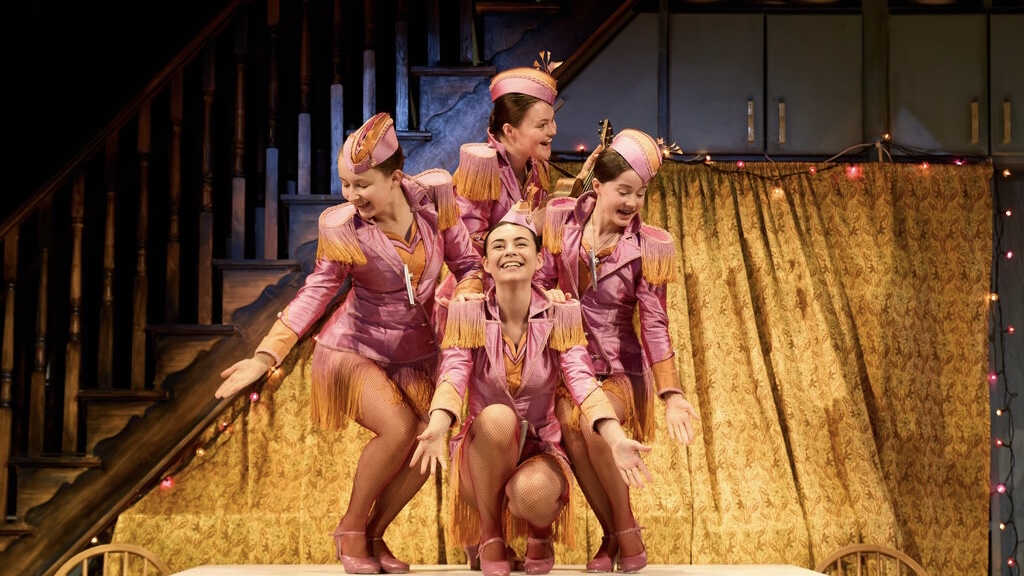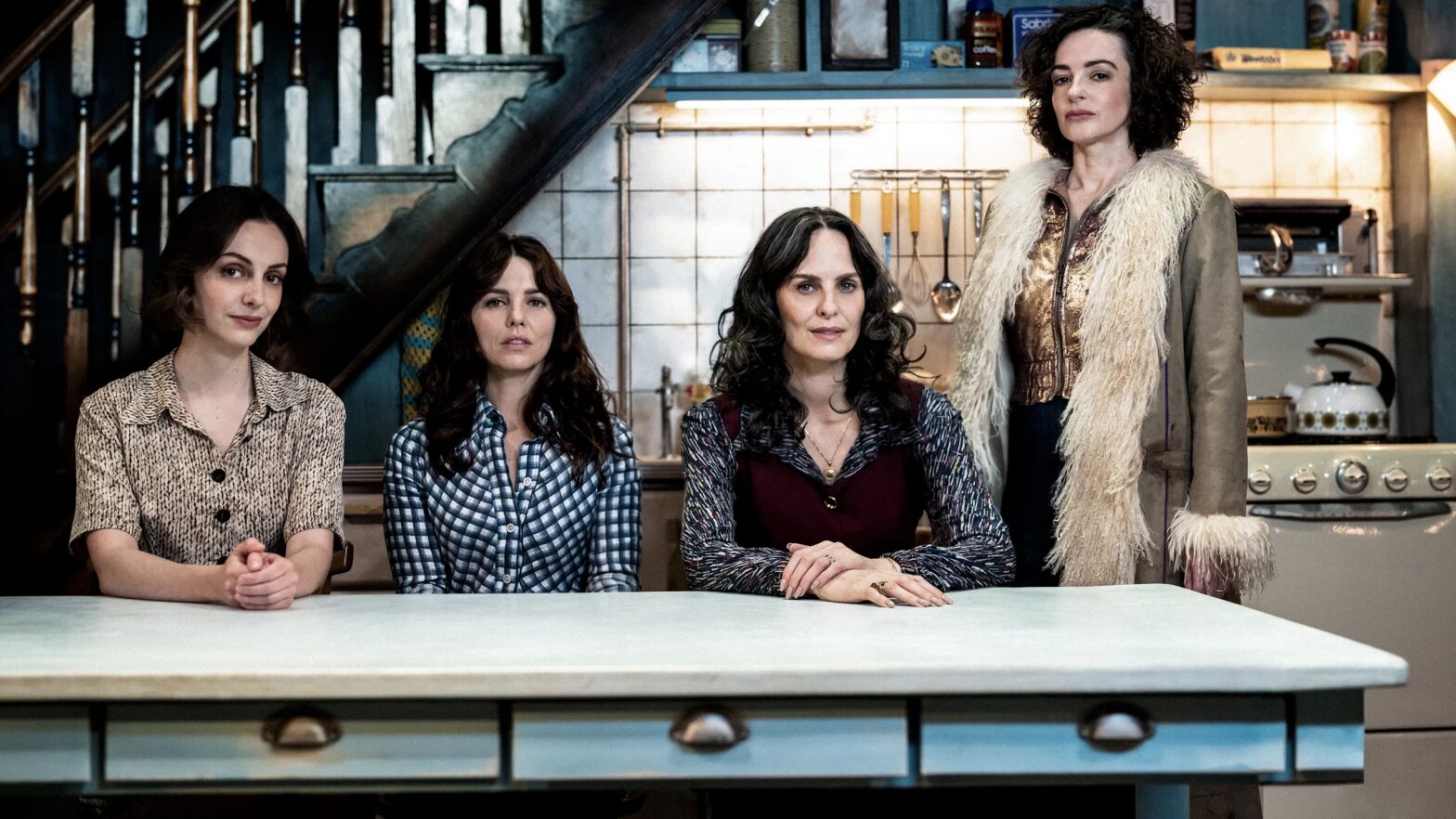No lights. No sound. Just a haunting stillness stretched across the Broadhurst Theatre on the breezy evening of Oct. 7. When the first line finally broke through, it was like the start of a slow disclosure — a truth that’s been buried deep, waiting for its moment. First premiering on Jan. 27 of this year in London, The Hills of California is making its Broadway debut this fall with its final show on Dec. 22. It’s not a play to simply watch; The Hills of California demands to be felt, lived through, and carried with you long after the curtain falls.
British playwright Jez Butterworth, in collaboration with director Sam Mendes, doesn’t just tell a story, but invites the audience into the fractured hearts of Joan, Gloria, Jill, and Ruby — sisters bound by blood and bruised by a past they can’t seem to let go of. Set in the shabby seaside hotel where these women grew up, the play oscillates between their girlhood and present-day reunion at their mother’s deathbed. The volatile chemistry between the sisters drives the play as their lives unfold in the shadow of their mother’s love and the weight of something far darker. But Butterworth is far too smart to spoon-feed us with neat conclusions — he lures his audience to lean forward in their chairs, and catch the moments of tension in the words left unsaid.
Laura Donnelly’s dual performance as Veronica, the fiercely devoted mother, and the eldest daughter Joan is nothing short of extraordinary. As Veronica, Donnelly wields her authority like a shield, juggling the chaos of running the family’s dilapidated hotel while obsessively grooming her daughters to emulate the success of the legendary Andrews Sisters (one of the top-selling American singing groups in history). But it’s her portrayal of the adult Joan that is truly breathtaking. With a nonchalant coolness and a penchant for storytelling, Joan is a character caught between the innocence of her childhood and the burdens of her reality. It’s a delicate balance, but with Donnelly’s authentic performance, the emotional weight of the family’s shared history leaves a scar that stretches from the stage to the audience.
What truly gives the play its emotional depth is the nuanced portrayal of trauma —Butterworth’s storytelling is powerful not because of what is shown, but because of what is withheld. What happened to young Joan is deliberately blurred, and while her childhood is a pivotal moment in her character arc, it is addressed with a subtlety that avoids sensationalism. As Joan revisits the night that shattered their family in a tear-jerking monologue, the audience is spared the graphic details. Instead, the focus is on the aftermath — the silence, the shame, and the slow decay of trust between the sisters. It’s not exaggerated, It’s human. It’s devastating.
Gloria, played ferociously by Leanne Best, and Joan’s contrasting reactions to their past are brought to life with incredible precision. Gloria, brash and brittle, barrels through life, while Joan retreats into cigarettes and silence, evoking how trauma can swim differently within each of us. Sam Mendes’ direction amplifies this range beautifully, there’s no rush to deliver big moments. The play breathes in its quiet spaces, letting the weight of what isn’t said trickle down and rest in the play’s setting. The crumbling hotel in which the sisters gather is no mere backdrop; it’s a metaphor for the ruin they’ve all been living in for decades. The once grand staircases lead to nowhere, and the piano — forever out of tune — echoes the tension between the siblings in minor keys and aching melodies.
This play is a masterclass in stagecraft. The set, designed by Rob Howell, evokes a grandeur that lives in a past that lingers like dust on the top shelf, impossible to sweep away entirely. You can almost feel the weight of years that have pressed down on the hotel walls, much as the sisters’ unresolved emotions press down on them. Mendes lets the past and present blend seamlessly on stage, as the characters slip in and out of memories so fluidly that you forget what time you’re in. Isn’t that what trauma does? It refuses to stay locked away in the past.

Source: Mark Douet/New York Times
It would be easy to get lost in the darkness of The Hills of California, but Butterworth is careful not to let his audience drown in sorrow. There’s humor here too — sharp and biting — woven into the dialogue. Ruby, played by Ophelia Lovibond, is the effortlessly chic middle sister. She throws around flippant remarks while making bold fashion choices, appearing to glide above the troubles that weigh down her siblings. However, as her character unfolds, it becomes clear that she too carries deep scars and her sarcasm is only a floating device for her sanity.
On the other hand, Gloria is all simmering rage. Her volatile outbursts clash with Ruby’s deflections. Meanwhile, the youngest sister Jill, played by Helena Wilson, stays behind with their mother as her condition worsens. While her sisters have moved on, she’s been trapped in the past.
By the time the final scene unfolds, the emotional gravity of the sisters’ story reaches a climax. There’s no right or wrong answer, no dramatic redemption arc. Life, Butterworth reminds us, is messy, unresolved, and full of unanswered questions. Joan may never speak the truth she’s been holding onto. Gloria may never fully heal. Ruby and Jill may keep running from their pain. But isn’t that the point? Sometimes the most human stories are the ones that leave you with more questions than answers.
The Hills of California isn’t just a play. It’s a mirror. It reflects the brokenness we all carry, the unsaid things that sit heavy on our hearts, and the bittersweet truth that love, however fractured, is what holds us together in the end. It’s a rare kind of play, the kind that draws you in, makes you think back, makes you feel. You will laugh. You will cry. But most of all, you’ll remember.








Leave a Reply